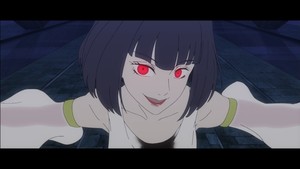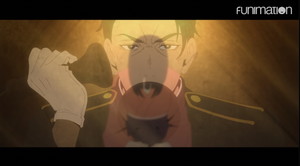The Spring 2021 Preview Guide
MARS RED
by The Anime News Network Editorial Team,
How would you rate episode 1 of
MARS RED ?
Community score: 3.6
What is this?

It's 1923 and vampires have existed for quite a while. But now, the number of vampires is increasing and a mysterious, artificial blood source called Ascra has appeared. The Japanese government, in turn, creates “Code Zero,” a unit within the army tasked with taking down the vampiric forces. And there's no better way to track vampires than by using vampires.
MARS RED is based on Bun'ō Fujisawa's dramatic stage reading production of the same name and streams on Funimation on Mondays.
How was the first episode?
 James Beckett
James Beckett
Rating:
Man, MARS RED's premiere is something I should have eaten up like greedy kid at a cake buffet. The Taisho Era setting on 1926 Japan is something I'm fond of, aesthetically speaking, and you know I'm all about complex vampire horror dramas. On top of all that, the whole show is an adaptation of a stage performance with themes and visuals that are drenched in obvious love for the history and power of theater? Based on those foundations alone, you could have very well retitled this one “SICK-ASS NERD ANIME MADE SPECIFICALLY FOR JAMES”. And yet, when I actually sat down to watch MARS RED's first episode, I found myself shockingly unmoved. Bored, even. Despite the admirably confident direction and animation from Signal.MD, I simply could not find a way to latch on to what MARS RED was offering, no matter how much I wanted to.
I think a big cause for this would have to be the obtuse character writing. I mean there's ambitious, and there's intelligent, and then there is whatever it is MARS RED was up to here with its script, which didn't quite possess enough of either of those qualities for my liking. All of the setup done to establish our hero Maeda, and his eventual placement as the leader of the Code Zero squad of vampire hunters, feels too dry and detached from the episode's central case. Speaking of, the story of the actress who is killed by a falling prop, only to be revived as a vampire that can only recite arch monologues from Oscar Wilde's Salomé , is something that I suspect works a lot better on paper than in practice — I started watching the show in English, only to find the constant recitation of grim exposition and Wildean drama a bit too much for my ears, though the show didn't fare much better in Japanese, either. The emotional connection between Maeda and the doomed vampiress is vague and unconvincing, and the procedural aspect of the investigation amounts to a lot of wheel-spinning before the climax begins more or less of its own volition. The Defrott character seems like an interesting addition to the mix, though they don't get to do much other than pontificate on the sidelines while the plot strides ever along.
I think there is definitely some version of MARS RED that I could really grow to love, and it may very well come into being as the show continues on this season. The visuals are ace, for one thing, and perhaps the world and characters will grow on me if the writing can get out of its own way, first. Heck, I might even come back to this premiere someday in a different headspace and find that it suddenly clicks with me. This time, though, MARS RED only left me feeling cold.
 Caitlin Moore
Caitlin MooreRating:
MARS RED is an anime I can honestly say I very much appreciated, but did not particularly enjoy. It's not that it did anything wrong, but in the end, it's just not to my taste.
Based on a stageplay by Bun'ō Fujisawa and drawing heavily on Oscar Wilde's Salomé, MARS RED is a highly theatrical production, at least for this episode. I am no stranger to the stage; although none of us have done anything we'd get recognized for on the street, acting is practically a family business for my branch of the Moores. Much of the episode feels staged rather than framed, with elements like shot composition and lighting taking cues from the visual language of theater rather than film or animation.
Some people will enjoy this; I did not. Call me a fuddy-duddy, but stage and screen are separate mediums and different things work in each one. I don't even like watching taped stage musicals, and seeing theatrical language on-screen always heightens the artificiality for me and takes me out of it.
MARS RED expects you to have at least some understanding of that language as well. I will give it credit for refusing to hold its audience's hand. There is no big explanation at the end that sums up what has happened; other than Maeda learning about the vampire he's about to meet, the script offers little exposition. Instead, it's up to you to put together the hints of what's happening with Maeda and Misaki. I actually appreciated this; so many anime too easily lean on explaining every little thing instead of letting their audience connect the dots. Some of the visual symbolism, like Maeda's shadow hanging over Jokanaan's head on the Salome poster, is easy to pick up on; other cues, not so much.
If only I had connected emotionally to the story! Maeda speaks of a fiancée he's never met, and the recently-turned vampire Misaki, who endlessly repeats the monologue she was reciting when a stage light struck and killed her, was looking forward to seeing her fiancée for the first time at her play. The only times she seems to snap back into the moment have to do with Maeda, such as commenting on his cute handwriting. There's a real tragedy to be found here, and I wish it had touched my heart.
But Maeda is about as personable and emotive as a hunk of petrified wood. He's completely unengaging as a protagonist, and though there were glimpses of who he is under that stoic exterior, I couldn't bring myself to be interested in Serious Military Man. Since he's the one the series is about, I can't see myself getting enthused about watching MARS RED further.
 Nicholas Dupree
Nicholas DupreeRating:
I'm of two very different minds on this premiere. Typically, I like to come out of a first episode with at least a general idea of what kind of show I can expect going forward. Usually that means having a decent grasp of the central premise, a read on the main character's personality and motivation, and at least a vague idea of where the plot is going by episode's end. On those terms, the first episode of MARS RED is a mess. The central premise of Taisho-era vampire hunters is established largely through implication rather than action or cogent explanation. Our main character is resolutely stoic through every second of his screen time. By the time credits roll the only narrative thread we have to go on is that our hero will be the commander of an eventual Vampire Hunter squad, and everything else about the larger plot is one big question mark.
Yet if I were to judge this premiere on how striking it is, how much it kept my attention through its esoteric runtime, I'd have to give it top marks. There is a strong, unique voice in this show that I absolutely wasn't expecting. Given Funimation's heavy promotion I anticipated a fairly typical supernatural action series, yet MARS RED seems determined at every point to choose the least conventional means of anime storytelling available. While there is some action, any severe violence happens totally off-screen, communicated through implication rather than direct gore. Similarly, the meat of this opening story is never outright stated, leaving viewers to pay attention and remember seemingly offhand lines of dialogue to piece together the strange tragedy at its heart.
It's likely to be a divisive approach, especially for a series getting as much of a push as this one, but it certainly caught and maintained my attention. The direction and storyboarding are responsible for a lot of that, as there's a concerted effort to evoke the feeling of the stageplay origins of this project, with very strong results. It's also letterboxed for the entire premiere, and presumably the rest of the show, which I'm typically not a fan of. But it works well enough for now. The integration of 3D environments is more questionable, but by and large the visual language of this opener carries itself with confidence, and it certainly leaves an impression. Also apparently the guitarist from Escape the Fate worked with HYDE to write the ED theme, which threw me for about 3 loops.
Overall I don't really know what to expect from this show, or if I even think it will be good. There are just too many hanging questions at the end of this to say for sure. But more importantly I AM interested in having those questions answered, and seeing more of what this surprise has to offer. So in that regard, I'll call this premiere a success.
 Rebecca Silverman
Rebecca Silverman
Rating:
Until MARS RED began quoting from the 1894 version of Oscar Wilde's play Salomé, I wasn't sure I liked its very self-consciously arty style. But Oscar Wilde was, among many things, self-consciously arty, and thus the references to that specific play bring a lot of this episode together. Possibly it does this in a way that brings us back to the line “All art is quite useless” in The Picture of Dorian Gray, but at least it comes from the same author.
So yes, if you were wondering, all of Misaki's spoken lines are lifted directly from Salomé, the play she was starring in when she was killed and turned. (Or turned and then killed? The details are a bit fuzzy.) Salomé tells the story of the daughter of Herodias, who is associated with the death of John the Baptist (AKA Jokanaan) and who is perhaps best known for performing the infamous dance of the seven veils. She's synonymous with seduction in a lot of senses, but MARS RED's first episode instead chooses to play up the tragic romance aspect of her character, attempting to set up a parallel between Salomé/Jokanaan and Major Maeda and the fiancée he never met, Misaki. It sort of works, but really only from Misaki's point of view – Maeda doesn't give the impression that he cared all that much about his mysterious fiancée (the daughter of his superior officer, unless I'm totally wrong), whereas it's made clear that Misaki very much wanted to meet and marry him. That gives the romance this episode all the thrill of watching the fabled dancer attempt to seduce a cardboard box while other people mutter stuff about vampires in the background.
MARS RED seems ambitious, I'll give it that. While it isn't treading any new ground in terms of vampire lore or even between-the-wars fiction, it does seem to have all of its pieces lined up, with the stoic military man, his chatty cohort, the shota vampire, and the girl reporter – because what self-respecting fiction set in the 1920s doesn't have a girl reporter? The visuals are a nice mix of muddy browns and sudden moments of brightness that work nicely; the scenes on the stage where Misaki died are especially effective, even if her turning to ash doesn't quite have the impact that it seems to think it does. There's also a nice focus on the sigil of vampirism being on Misaki's tongue, not for sexy reasons, but because several of Salomé's lines involve tongues and poison.
There is potential here, even if it is suffering from a surfeit of artiness and ambition. I'm not a big fan of vampire stories, but I do like Oscar Wilde and the Taisho era, so this may get a second episode from me to see where it goes now that what is essentially the prologue is over.
 Lynzee Loveridge
Lynzee Loveridge
Rating:
Vampires and historical setting collide in MARS RED, a show that honestly left me cold. I attribute most of this to the series' protagonist, military man Yoshinobu Maeda. Maeda is an up-and-comer and the head of an experimental military unit of vampires known as “Code Zero.” He returns to Tokyo to evaluate a recently captured vampire named Misaki. Misaki was formerly a stage actress before her infection and now her remaining semblance of humanity is tied to her performance as Salome in Oscar Wilde's titular play. Maeda strikes me as very 'by the books' in his approach to work, although his superiors continually warn him to not empathize with his vampire captive. While he does at times react to Misaki's theatricality and the few moments she breaks from her monologues, I found Maeda to be dreary without any hints of pathos to explain it.
It's only when evaluating the short-lived relationship between prisoner and jailkeep that the series gains any of my interest. Trapped in a room within a subterranean labyrinth, Misaki recites her lines of love and adoration for the deceased Jokanaan's severed head, better known as John the Baptist. As the episode goes on, “Jokanaan” seems to refer to the figure in the play and Maeda simultaneously. These layers of what at times seems like a tragic romance are reliant on the viewer's familiarity with Wilde's play. Undoubtedly the series' original creator is; Bun'O Fujisawa is better known in Japan for creating his own experimental stagework.
Misaki's role isn't as pure-hearted as perceived here; Salome initially sought a lover in Jokanaan as he sat prisoner to her father, King Herod. After Salome performs a dance that enthralls the court, she requests Jokanaan's head as payment. Her monologue where she confesses her desires and intention of taking them are delivered to a severed head no longer able to rebuke her. It's a rather artistic parallel between vampirism, eroticism, and tragic longing. Misaki's escape from prison and her short dance with Maeda makes for a stinging parallel.
MARS RED seems set to follow in the moody footsteps of Shōwa Genroku Rakugo Shinjū, but it's difficult to pin down how effective it is so far. I'll give it a few more episodes, but would not be surprised if this premiere left many audiences cold.
discuss this in the forum (370 posts) |
this article has been modified since it was originally posted; see change history
back to The Spring 2021 Preview Guide
Season Preview Guide homepage / archives